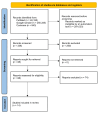Sudden Cardiac Death: A Systematic Review
- PMID: 37664320
- PMCID: PMC10473441
- DOI: 10.7759/cureus.42859
Sudden Cardiac Death: A Systematic Review
Erratum in
-
Correction: Sudden Cardiac Death: A Systematic Review.Cureus. 2025 Aug 26;17(8):c271. doi: 10.7759/cureus.c271. eCollection 2025 Aug. Cureus. 2025. PMID: 40881915 Free PMC article.
Abstract
Sudden cardiac death (SCD) is a condition that accounts for a high percentage of cardiovascular fatalities, with ventricular tachyarrhythmias being the most common cause. There are signs and symptoms of SCD that occur spontaneously without any warning and are deadly. Despite preventative efforts focusing on the use of subcutaneous implanted cardioverter defibrillators (S-ICD) in the highest-risk population categories, a high number of SCDs occur in the normal population and in people who do not have a documented cardiac condition. Therefore, primary prevention for SCD should be a more viable strategy for the general population, considering measures in the form of preventive medicine such as knowing more about any genetic predisposition, family history of any fatal arrhythmia, continuous surveillance after any syncope with unknown causes, etc. However, little data about SCD risk factors are known in comparison with other well-known diseases like ischemic heart disease and stroke. In search of medical databases for relevant medical literature, we looked at PubMed/Medline, the Cochrane Library, and Google Scholar. Thirteen publications were discovered after the papers were located, assessed, and qualifying criteria were applied. The finished articles were done to give an overview of SCD. Some others have shown that the major predisposition for SCD is related to the male gender, which increases the incidence if they have a family history of SCD. We described the importance of obstructive sleep apnea (OSA) as a comorbid condition. Patients with S-ICD and young athletes with a history of ventricular arrhythmia showed us that the predisposition for SCD can be higher than in the normal population. Based on the above, we concluded that more study is required to establish the most important approach for each of the risk factors mentioned in this systematic review in order to apply them in daily practice and have more knowledge about how to apply preventive and therapeutic medicine to the population at risk and the ones that already develop the disease.
Keywords: cardiac arrest outcome; implantable-cardioverter defibrillator; obstructive sleep apnea (osa); phase-i cardiac rehabilitation; sudden cardiac death.
Copyright © 2023, Jaramillo et al.
Conflict of interest statement
The authors have declared that no competing interests exist.
Figures
References
-
- Exercise heart rate reserve and recovery as risk factors for sudden cardiac death. Kurl S, Jae SY, Voutilainen A, Hagnäs M, Laukkanen JA. Prog Cardiovasc Dis. 2021;68:7–11. - PubMed
-
- Physical function, psychological adjustment, and self-efficacy following sudden cardiac arrest and an initial implantable cardioverter defibrillator (ICD) in a social cognitive theory intervention: secondary analysis of a randomized control trial. Dougherty CM, Liberato AC, Streur MM, et al. BMC Cardiovasc Disord. 2022;22:369. - PMC - PubMed
Publication types
LinkOut - more resources
Full Text Sources

